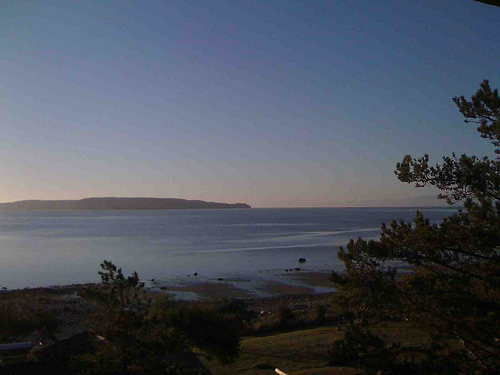
Hollyhock, Cortes Island, at Web of Change (photo by kgott)
Inside report from Web of Change 2010
Guest post by Jocelyn Harmon
Care2
Two weeks ago I had the incredible opportunity to travel to beautiful Cortes Island, British Columbia, for the epic adventure that is Web of Change. This annual conference, now in its 10th year, is a gathering of leaders working at the intersection of technology and social change. That’s a fancy way of saying that people who care about progressive issues like climate change, sustainable living, human rights, etc. get together every year to figure out how to leverage the Internet to do their work a little better.
To mark their first decade, this year, Web of Change organizers decided to pay special attention to the issue of diversity in their ranks. Specifically, the conference leaders raised $25,000 to bring 24 movement leaders of color to lead and participate in this three-day convening by the sea.
Grassroots organizers from Puente, Florida Immigrant Coalition, Presente.org, The Ruckus Society, National Day Laborer Organizing Network (please check out their websites), and more trekked to Hollyhock – a very special retreat center – to share their tales of triumph and woe. These amazing leaders were joined by the traditional WOC crew comprised of brilliant consultants, technologists and online organizers from organizations like Free Press, Alliance for Climate Education, SeaChange Strategies, Communicopia, and EchoDitto. For a full list of all WOC participants, please go here.
Before I tell you what I learned at Web of Change, let me just say that this is no ordinary conference. For starters, they have a much celebrated hot tub and lots of wine and beer! Mornings start with mediation and yoga with colleagues (awkward!) and meals are all veggie all day long. But seriously, expert facilitation and the awesome landscape of Hollyhock make for a very intimate and emotional gathering – a key point of the entire exercise.
Immigration reform: Bringing it home with personal stories
We spent much of the weekend talking about immigration reform. This human rights movement served as the focal point for our conversations about organizing strategy, bridging online and grassroots campaigning, and being more open about our failures.
I listen to NPR, so I thought I knew about the struggles in Arizona, but hearing personal stories about the current-day atrocities forced me to acknowledge my ignorance and ignited my passion to get involved. For example, on the last day of the full session, Juan Rodriguez, an organizer for Florida Immigrant Coalition, told a personal story. (You can view it here.) He shared his sadness over his father’s recent deportation. (His family has been in the U.S. for over 15 years!) After this testimonial, there wasn’t a dry eye in the house. In short, what I (and many of us) had viewed as an abstract if terrible problem suddenly became painfully concrete.
My key takeaway from this conference is twofold.
First, we need to get to know each other and nonprofit conferences must facilitate this need. I mean we really need to get to know each other, not as colleagues or networking buddies but as human beings. If there is any hope for collaboration and coalition-building among nonprofits and organizers, it’s not going to come from shiny new campaigns, mergers, or foundation-forced collaboration, it’s going to come from the hard work of building deep and enduring relationships between individuals with different backgrounds. This takes time and requires us to step out of our comfort zones. Sometimes it even requires learning a new language. WOC provides an excellent laboratory for doing this delicate, frightening, but ultimately rewarding, dance.
Second, the success of the progressive movement (and I don’t think I’m being hyperbolic here) rests, in large measure, on our ability to forge relationships across race and class. Why? It’s not coincidence that people working on the frontlines of social change, in some of the toughest communities in the U.S., are people of color or folks who are otherwise marginalized and oppressed. This contrasts with leaders of “the nonprofit industrial complex” and many online organizers who are predominantly upper middle class, American whites. Bridging these communities means giving expression to our differences and having frank discussions about power and privilege. It also means bearing witness to our shared goals – saving the planet, restoring dignity to all Americans, getting toxins out of our communities, etc.
I’ll leave you with this thought.
Trust, not attention, is the scarcest resource in our busy, harried lives. To build it, we need to find the energy, courage and time to forge relationships across “borders” so that together we can create a better world. Thank you Web of Change for providing a space for so many of us to connect, be hopeful and dream.









JD,
Thanks so much for letting me share this post with your readers! Building relationships within our sector is so important and will (in my humble opinion) be critical to building the TRUST we need to take the Progressive Movement to the next level.
Jocelyn
Very inspiring post, Jocelyn! Wish I was there — maybe I can get to Web of Change next year!